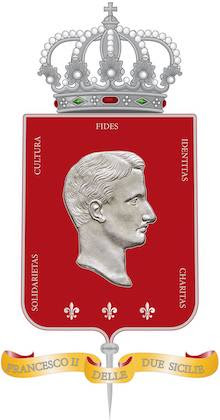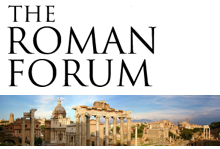Guest Op-Ed
Submitted by Erasmo Russo
While an ever growing literature on “Italian American” identity is coming out of American academia, several key issues have been largely ignored. From a Neobourbon/Two Sicilies perspective the terms “Italo-americano” and “Italian American” have become common shorthand for a vague set of markers, but which at the end of the day, at best fall short of any meaningful descriptiveness of the ethnos and at worst are mere constructs of Americans for American purposes. For purposes of this article the term “Italian American” will be used according to general American usage to include broadly all people and cultures of the Italian peninsula and islands transplanted to the United States. “Italian” will be used in the political and legal sense of “citizens of the modern nation of Italy."
The Italian American community has fallen prey to the worst aspects of American “pick me” political culture. As is well known, for generations Italians living in the Americas identified themselves within the diaspora communities based on their region or city of origin and only vis-à-vis outsiders would merely employ the term “Italian.” “Italians” are a vastly diverse people based on regional languages and traditions and unique local history. Most foreigners are even acutely aware of this. In the United States the lumping of distinct peoples into one monolithic group was done formally by authorities and by the outside American society for simplicity sake to create voting blocks and groups to be proselytized to and to be more readily assimilated. From the left, “Italians” were a mass of radical workers and syndicalists, and from the right they were a mass of conservative middle class and upwardly mobile voters. Political and sociological ideologies as well as the diversity of the immigrant diaspora communities allowed “Italians” to be all of these simultaneously. Businessmen and men of letters, and activists radicals and laborers at the same time. The net effect of constant recruitment efforts from the left and from the right has led to many Italian Americans seeking prominence via America's “pick me” culture. Most notably in American academia, which is dominated by the left, Italian Americans often vie to please Anglo American liberals by loyal lockstep displays of ideology, while in politics and economics many vie to please Anglo American leadership by party support and voting loyalty. By this mechanism, Italian Americans, like all ethnic groups in the American empire, clamor to show loyalty to the dominant elite du jour, insisting they are “not like the rest” of their own group but are “just like good Americans.” Some often may even go so far as to claim they alone represent and typify their group’s best traits in this “pick me” posture. They then actively turn to their own group and demand conformity to their articulated positions and demean and denounce members of their own group who dare challenge their narrative.
As second and third generation members of the diaspora further assimilate and a new wave of younger better educated Italian immigrants moves to the United States, many public debates have challenged individuals and organizations who succumb to “pick me” culture and who proclaim they and their views are “Italian American” culture or ways. The pages of newspapers, scholarly journals and websites are replete with these debates. Among some of the most amusing pieces to appear in the last twenty years are self-proclaimed “Italian American” pundits from both the right and left who are now writing articles and books on how Italy should be as Americanized as possible and consume the same foreign products, be ashamed of its native culture, abandon religious practices, and should even become a nation of immigration and accept more outside groups in order to show its true progress as a NATO and G8 nation. This is clear proof that an “Italian American” identity has everything to do with the American landscape and nothing to do with the expression of italianità.
This American “pick me” phenomenon is a social and economic dead end for the diaspora community. In fact, it is a suicidal move for the ethnos. The American invention and manipulation of hyphenated identities is a modern notion which seeks to reconcile the foreign immigrant with the power of the centralizing nation state. In the 19th and 20th century as old world traditional empires which comfortably and organically were able to include many peoples faded away, the ethno state or nation state based on evolving checklists of authenticity became de rigueur. Groups such as those coming from modern nations like Italy are clearly unique and identifiably different than the Anglo dominant culture of the United States and its peculiar mixture of Protestant-Enlightenment limited oligarchic structure. Hyphenization culture is the easiest way to assimilate such ethnic groups. The foreign ethnos can keep its food and even religion, but must speak English and support local political parties, and indeed the host country’s entire socio-economic system and hierarchy. The creation of this third midway identity- “Italian American” leads to something that is neither American nor Italian. In these conditions the diaspora community is faced with a few options: become generic American, become Italian (in a generic modern Italian state way/pan Italianism), or retain their true original regional identity. For the Neobourbon and Two Sicilies minded people this latter regional identity represents the true path. Firstly, this is the most sincere and “authentic” choice, the easiest path, to continue living one’s life according to one’s true history and cultural ways. Secondly, adopting an ersatz pan-Italian mythology (based on Risorgimento and Fascist era propaganda) is often flatly incoherent and ultimately rings false. Finally, becoming “American” presents a vast amount of challenges, in that “American” often is reduced to either the deracinated absence of identity, or to obedience to Enlightenment ideas as filtered through English Freemasonry and Protestant settler theology from the British Empire predicated on divide and conquer strategies of governance.
This scenario plays out concretely every year in ongoing debates over whether the Genovese explorer Christopher Columbus should or should not be used as a symbolic rallying point for italianità in America; to what extent one may be “Italian” or “Italian American” if one is an Italian Jew or an Italian Waldensian and not a Catholic; or is it more or less authentic to be a Democrat or a Republican while living in the U.S.; and what position should the “Italian American community” take with respect to alliances with other ethnic groups. The Neobourbon response is simply that all of these debates are fruitless and moot because they are all internal American discussions at the end of the day and serve only American political and economic purposes. They do not provide an outlet or pathway for our people to live out our history or culture. The vast majority of the diaspora community has its roots in the former Kingdom of the Two Sicilies, ranging from Sicily and Malta to Campania, Abruzzo, Molise, Calabria, Basilicata, and Puglia. Therefore, being Duosiciliano or keeping one’s regional identity, as stated above, proves to be the most coherent choice. Similarly, this majority identity includes the unique way Catholicism is practiced by these regional groups. The Kingdoms of Naples and Sicily, and later the Two Sicilies, all having deep and lasting linguistic, cultural and economic ties to the Spanish Empire, it is logical that the Duosiciliano community finds its natural allies in Hispanic cultures and nations. These prongs of the Duosiciliano identity are in no way a limitation. On the contrary, they represent an authentic and organic point of departure to approach the world and all other groups. It is patently false and obtuse to attempt to construct an “Italian American” identity predicated upon blind loyalty to changing American political landscapes, atheism, globalism, or antiquated leyenda negra propaganda that specifically denigrates the Latin Mediterranean Catholic ethos.
So what should one do? The young especially should visit the Patria, i.e. their true Patria, the regions their ancestors truly came from, not a pseudo Grand Tour organized for outsiders which barely showcases Rome, Florence and Venice. They should learn both standard Italian and their regional language. They should study their regions’ history. They should practice their faith. They should conduct their daily lives as our people do and always did. They should learn the real reasons why their families emigrated and continue to emigrate. They should then share their knowledge and enthusiasm for their culture with the world as living exemplars. Lastly, they should remove themselves from the false dialectic of American nomenclature and discourse. When one is part of an ethnos one has no need of invented political or ideological identities. We must ask ourselves, who is served by us assuming a hyphenated identity? Is a hyphenated identity truly such a badge of honor and “success”? Be free Duosiciliani, not colonial “pick me” lackeys.










